2014高考英语听力原文及音频
- 格式:doc
- 大小:6.58 MB
- 文档页数:10
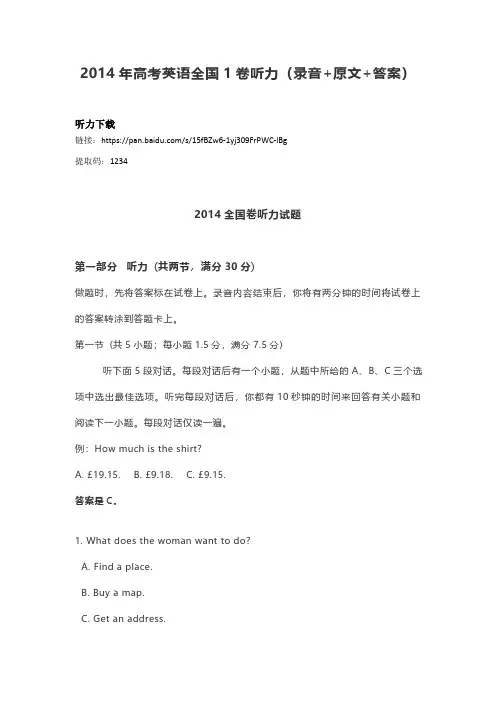
2014年高考英语全国1卷听力(录音+原文+答案)听力下载链接:https:///s/15fBZw6-1yj309FrPWC-lBg提取码:12342014全国卷听力试题第一部分听力(共两节,满分30分)做题时,先将答案标在试卷上。
录音内容结束后,你将有两分钟的时间将试卷上的答案转涂到答题卡上。
第一节(共5小题;每小题1.5分,满分7.5分)听下面5段对话。
每段对话后有一个小题,从题中所给的A、B、C三个选项中选出最佳选项。
听完每段对话后,你都有10秒钟的时间来回答有关小题和阅读下一小题。
每段对话仅读一遍。
例:How much is the shirt?A. £19.15.B. £9.18.C. £9.15.答案是C。
1. What does the woman want to do?A. Find a place.B. Buy a map.C. Get an address.2. What will the man do for the woman?A. Repair her car.B. Give her a ride.C. Pick up her aunt.3. Who might Mr. Peterson be?A. A new professor.B. A department head.C. A company director.4. What does the man think of the book?A. Quite difficult.B. Very interesting.C. Too simple.5. What are the speakers talking about?A. Weather.B. Clothes.C. News.第二节(共15小题,每小题1.5分,满分22.5分)听下面5段对话或独白。
每段对话或独白后有几个小题,从题中所给的A、B、C三个选项中选出最佳选项。
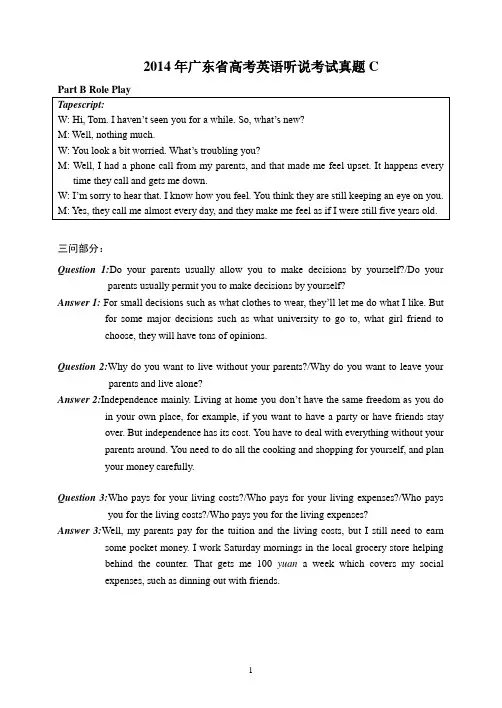
2014年广东省高考英语听说考试真题C三问部分:Question 1:Do your parents usually allow you to make decisions by yourself?/Do your parents usually permit you to make decisions by yourself?Answer 1: For small decisions such as what clothes to wear, they’ll let me do what I like. But for some major decisions such as what university to go to, what girl friend tochoose, they will have tons of opinions.Question 2:Why do you want to live without your parents?/Why do you want to leave your parents and live alone?Answer 2:Independence mainly. Living at home you do n’t have the same freedom as you do in your own place, for example, if you want to have a party or have friends stayover. But independence has its cost. You have to deal with everything without yourparents around. You need to do all the cooking and shopping for yourself, and planyour money carefully.Question 3:Who pays for your living costs?/Who pays for your living expenses?/Who pays you for the living costs?/Who pays you for the living expenses?Answer 3:Well, my parents pay for the tuition and the living costs, but I still need to earn some pocket money. I work Saturday mornings in the local grocery store helpingbehind the counter. That gets me 100 yuan a week which covers my socialexpenses, such as dinning out with friends.五答部分:Question 1:What made Tom feel upset?Answer 1:A phone call from his parents./His parents’ phone call.Question 2:How often do Tom’s parents call him?Answer 2:Almost every day.Question3:Who will probably decide Tom’s choice of university?Answer 3: His parents.Question 4:Where can young people have the freedom to have a party?Answer 4:In their own places./In his own place.Question 5:How does Tom get his pocket money?Answer 5:He works Saturday mornings in the local grocery store./By helping behind the counter in the local grocery store.参考复述:Mary wanted to buy a birthday present for her husband Tom, but she wanted to surprise him. So instead of asking him dire ctly, she asked Tom’s sister to phone him and ask him whathe wanted for his birthday. Then, she could listen to the conversation from the next room. While they were talking, she heard Tom say he wanted a pair of sneakers. Soon after, Mary went to a shop a nd bought a pair of nice new sneakers for him. When Tom’s birthday arrived, Mary gave him the present. Tom opened the package, and looked at the shoes, but he didn’t seem very excited. Mary asked him what was wrong. She said she thought he had wanted a pai r of sneakers. Tom laughed. He said that actually, he’d wanted a pair of speakers.。
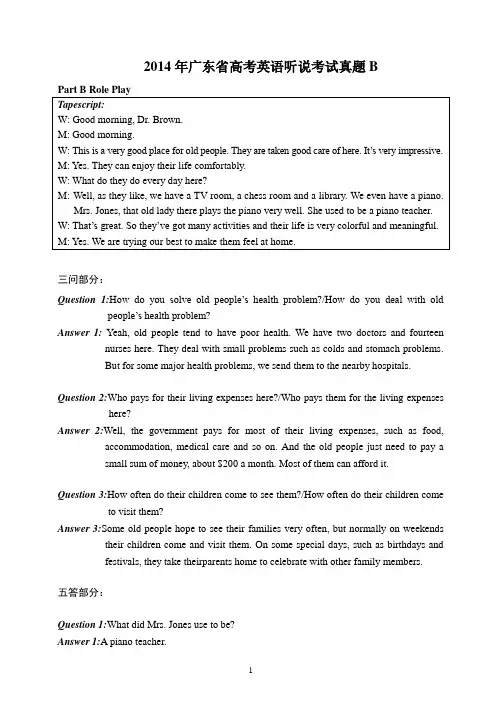
2014年广东省高考英语听说考试真题B三问部分:Question 1:How do you solve old people’s health problem?/How do you deal with old people’s health problem?Answer 1: Yeah, old people tend to have poor health. We have two doctors and fourteen nurses here. They deal with small problems such as colds and stomach problems.But for some major health problems, we send them to the nearby hospitals.Question 2:Who pays for their living expenses here?/Who pays them for the living expenses here?Answer 2:Well, the government pays for most of their living expenses, such as food, accommodation, medical care and so on. And the old people just need to pay asmall sum of money, about $200 a month. Most of them can afford it.Question 3:How often do their children come to see them?/How often do their children come to visit them?Answer 3:Some old people hope to see their families very often, but normally on weekends their children come and visit them. On some special days, such as birthdays andfestivals, they take theirparents home to celebrate with other family members.五答部分:Question 1:What did Mrs. Jones use to be?Answer 1:A piano teacher.Question 2:How many nurses are there in this place?Answer 2:Fourteen.Question3:What will be done when old people have serious diseases?Answer 3: They will be sent to the nearby hospital.Question 4:Who pays for most of their living expenses?Answer 4:The government.Question 5:When will the children take their parents home?Answer 5:On some special days, such as birthdays and festivals.参考复述:Mary was afraid of the dark. When she looked around when the lights were off, she seemed to see all kinds of scary things. Her parents said she shouldn’t be afraid, but their advice didn’t help her. Then one day her aunt visited. Her aunt was famous for her adventures and bravery, so Mary was eager to talk with her. Her aunt told Mary that she should just touch whatever was scaring her. Then she’d see there is nothing to be scared of. That night, Mary tried it. She saw something scary, but when she touched it, she found it was only her favorite toy bear. She felt happy, and touched everything else in her room. They all turned out to be toys. After that, she wasn’t afraid of the dark anymore.。
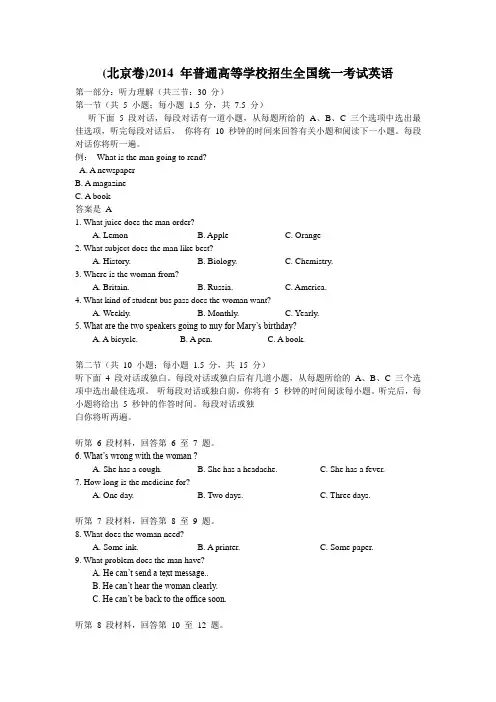
(北京卷)2014 年普通高等学校招生全国统一考试英语第一部分:听力理解(共三节:30 分)第一节(共5 小题;每小题 1.5 分,共7.5 分)听下面 5 段对话,每段对话有一道小题,从每题所给的A、B、C 三个选项中选出最佳选项,听完每段对话后,你将有10 秒钟的时间来回答有关小题和阅读下一小题。
每段对话你将听一遍。
例:What is the man going to rend?A. A newspaperB. A magazineC. A book答案是A1. What juice does the man order?A. LemonB. AppleC. Orange2. What subject does the man like best?A. History.B. Biology.C. Chemistry.3. Where is the woman from?A. Britain.B. Russia.C. America.4. What kind of student bus pass does the woman want?A. Weekly.B. Monthly.C. Yearly.5. What are the two speakers going to nuy for Mary’s birthday?A. A bicycle.B. A pen.C. A book.第二节(共10 小题;每小题 1.5 分,共15 分)听下面4 段对话或独白。
每段对话或独白后有几道小题,从每题所给的A、B、C 三个选项中选出最佳选项。
听每段对话或独白前,你将有5 秒钟的时间阅读每小题。
听完后,每小题将给出5 秒钟的作答时间。
每段对话或独白你将听两遍。
听第6 段材料,回答第6 至7 题。
6. What’s wrong with the woman ?A. She has a cough.B. She has a headache.C. She has a fever.7. How long is the medicine for?A. One day.B. Two days.C. Three days.听第7 段材料,回答第8 至9 题。
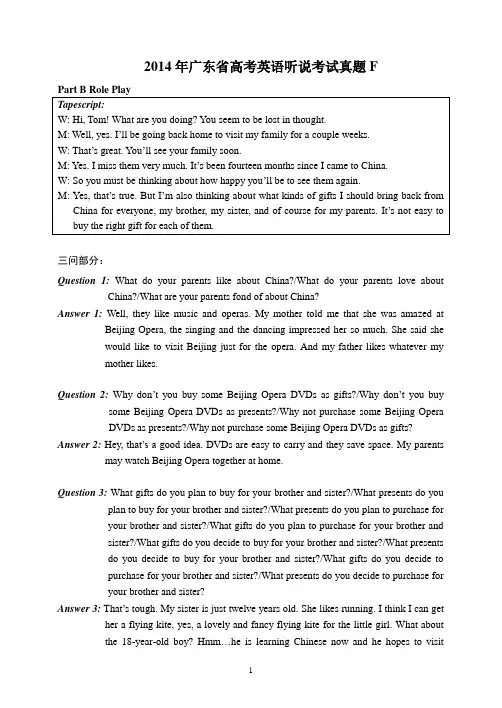
2014年广东省高考英语听说考试真题F三问部分:Question 1:What do your parents like about China?/What do your parents love about China?/What are your parents fond of about China?Answer 1: Well, they like music and operas. My mother told me that she was amazed at Beijing Opera, the singing and the dancing impressed her so much. She said shewould like to visit Beijing just for the opera. And my father likes whatever mymother likes.Question 2:Why don’t you buy some Beijing Opera DVDs as gifts?/Why don’t you buy some Beijing Opera DVDs as presents?/Why not purchase some Beijing Opera DVDsas presents?/Why not purchase some Beijing Opera DVDs as gifts?Answer 2:Hey, that’s a good idea. DVDs are easy to carry and they save space. My parents may watch Beijing Opera together at home.Question 3:What gifts do you plan to buy for your brother and sister?/What presents do you plan to buy for your brother and sister?/What presents do you plan to purchase foryour brother and sister?/What gifts do you plan to purchase for your brother andsister?/What gifts do you decide to buy for your brother and sister?/What presentsdo you decide to buy for your brother and sister?/What gifts do you decide topurchase for your brother and sister?/What presents do you decide to purchase foryour brother and sister?Answer 3:That’s tough. My sister is just twelve years old. She likes running. I think I can get her a flying kite, yes, a lovely and fancy flying kite for the little girl. What aboutthe 18-year-old boy? Hmm…he is learning Chinese now and he hopes to visitChina soon. So maybe I can get him a T-shirt printed with some Chinesecharacters. That’ll make a good gift.五答部分:Question 1:How long has Tom been in China?Answer 1:For fourteen months.Question 2:Why was he deep in thought?Answer 2:He thinks about how happy he’ll be to see his family and what kinds of gifts he should bring back from China for everyone./He thinks about how happy he’ll be tosee his family and what gifts he should buy for them.Question3:What might be the reason for Tom’s mother to visit China?Answer 3: She likes Beijing Opera.Question 4:What are the advantages of DVDs as gifts?Answer 4:They are easy to carry and they save space.Question 5:What gift will Tom buy for his sister?Answer 5:A lovely and fancy flying kite./A flying kite.参考复述:Tom is very forgetful and careless with his money. He often forgets his money at school, or finds that his dog has eaten some of his cash. One day, his mother was washing some of Tom’s clothes. She usually checks his trouser pockets before putting them in the washingmachine, but this time she forgot. Tom was reading in another room, when suddenly he remembered he’d had a ten-pound note in his trouser pockets. He quickly ran to his mother and asked her if she’d put his trousers in the machine. She said she had put them in about twenty minutes before. Tom went to the machine and took his trousers out. He finally found the ten-pound note in the pocket of his trousers, but it had lost its color and looked like a piece of white paper. Tom was very disappointed.。
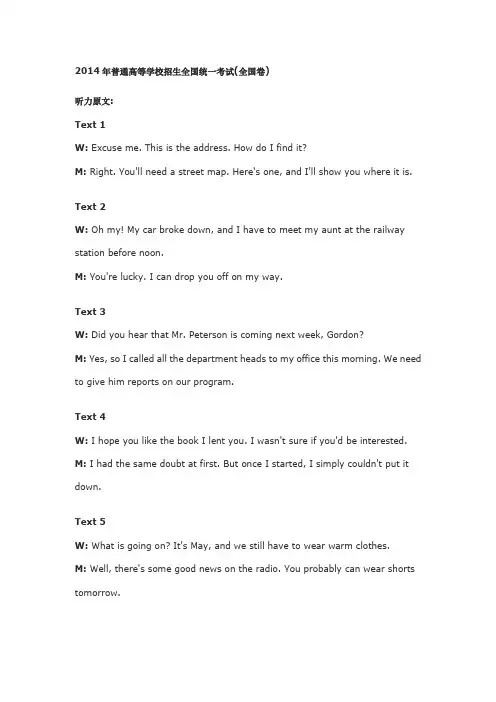
2014年普通高等学校招生全国统一考试(全国卷)听力原文:Text 1W: Excuse me. This is the address. How do I find it?M: Right. You'll need a street map. Here's one, and I'll show you where it is. Text 2W: Oh my! My car broke down, and I have to meet my aunt at the railway station before noon.M: You're lucky. I can drop you off on my way.Text 3W: Did you hear that Mr. Peterson is coming next week, Gordon?M: Yes, so I called all the department heads to my office this morning. We need to give him reports on our program.Text 4W: I hope you like the book I lent you. I wasn't sure if you'd be interested. M: I had the same doubt at first. But once I started, I simply couldn't put it down.Text 5W: What is going on? It's May, and we still have to wear warm clothes.M: Well, there's some good news on the radio. You probably can wear shorts tomorrow.Text 6W: Harry, let's play some ping-pong today.M: I'd love to play a set or two, but my right arm hurts. I've decided to stop playing ping-pong until it feels better.W: Well, how about going skating?M: I'd like to, but my knee hurts, too.W: Harry, stop making excuses! You're just lazy.M: No, I'm not! You know, there's a basketball match on TV today. Let's just stay home and watch it.W: OK. You stay, and I'll play with Helen.Text 7W: What do you want to do tonight?M: How about going to the cinema? I should be home from work at 5:45. Then we can go out and eat before we see a film.W: What do you want to see?M: There's a good art film at the Green House Cinema.W: Let's see…it starts at 6:15. I don't think we can get there in time to see the beginning. How about the action film at the New State Cinema? It starts at 6:50. Perhaps the 7:00 one at the UME Cinema is even better. It stars Jackie Chan. M: OK, that's fine. I like him, too.Text 8M: Hey, Lucy. Do you have some time to talk about next week's trip with me? W: Sure, Dave.M: OK. So, we're leaving on Monday from Hartsfield International Airport, andreturning on Friday. Do we take ourselves to the airport? Maybe we need to book a taxi, or just go by bus.W: No, we don't have to. The company car will pick us up and take us there. M: Oh, that's good. When?W: Our flight leaves at 11:00 a.m., so they should pick us up between 8:00 and 9:00 a.m. Besides, the company pays for our trip, including hotel and food. M: How much will that be?W: Well, New York is a pretty expensive city. So, each of us will get $200 a day. M: Oh, OK. Thanks for telling me that.W: You're welcome.Text 9W: Please sit down. Let's see…you're Mr. Smith. Is that correct?M: Yes. John Smith.W: And you're interested in this job?M: Yes, I am. I'll graduate from college the coming June. My major is Chinese. W: I see. Have you ever done any work in this field?M: Yes, I used to be a tour guide for Chinese travellers.W: Good. Now, how much money do you expect to have for a year?M: From what I've read, it seems that a starting pay would be around $12,000 a year.W: Here, you would start at $10,500 for the first year…a kind of training period. Then you would go to $15,000.M: That sounds fair enough. What do you think are the chances for me to get a job here?W: Well, I'm talking to three people today and four tomorrow. We'll be hiring two people. You'll hear from us sometime next month. Good luck! And thanks for coming in today.Text 10M: Well, I'd love to share with you my personal opinions on city life and life in small towns. I grew up in a small town until I was 18 and then moved to a big city, so I have experienced the good and bad sides of both. I never thought that I would like living in a big city, but I was wrong. After ten years of living in one, I can't imagine ever living in a small town again. Surely small towns and big cities both have some problems in terms of transport. In a small town, you have to own a car to make life comfortable. You can't get around without one because there isn't any kind of public transport. Big cities generally have heavy traffic and expensive parking, but there you have a choice of taking public transport, which is cheaper than driving. So, if you don't have a car, you'd better live in the city. I also love the exciting life in big cities. I can always enjoy a lot of films, concerts, and other wonderful shows. However, these things are not common in small towns. The final thing I like about large cities is that you can meet different kinds of people. However, you seldom find such a variety of people in a smaller town. I think that living in an area where everyone was just like me would quickly become dull. Of course, safety should be considered, and that's one area where small towns are better than big cities. Still, I would rather be a bit more careful and live in a large city than to feel safe but dull.第一节(共5小题;每小题1.5分,满分7.5分)听下面5段对话。
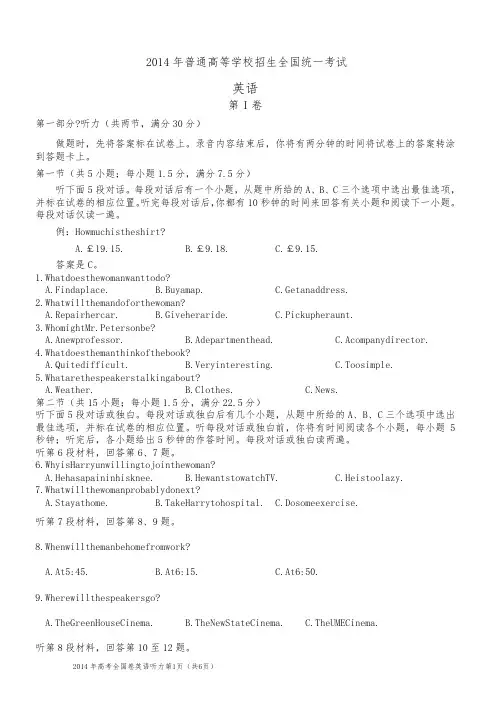
2014年普通高等学校招生全国统一考试英语第I卷第一部分?听力(共两节,满分30分)做题时,先将答案标在试卷上。
录音内容结束后,你将有两分钟的时间将试卷上的答案转涂到答题卡上。
第一节(共5小题;每小题1.5分,满分7.5分)5听第6听第7段材料,回答第8、9题。
8.Whenwillthemanbehomefromwork?A.At5:45.B.At6:15.C.At6:50.9.Wherewillthespeakersgo?A.TheGreenHouseCinema.B.TheNewStateCinema.C.TheUMECinema.听第8段材料,回答第10至12题。
10.HowwillthespeakersgotoNew York?A.Byair.B.Bytaxi.C.Bybus.11.Whyarethespeakersmakingthetrip????A.Forbusiness. B.Forshopping. C.Forholiday.12.Whatistheprobablerelationshipbetweenthespeakers?听第9听第18.Whatisthespeaker’sopiniononpublictransport?A.It’scomfortable.B.It’stime-saving.C.It’scheap.19.Whatisgoodaboutlivinginasmalltown?A.It’ssafer.B.It’shealthier.C.It’smoreconvenient.20.Whatkindoflifedoesthespeakerseemtolikemost?A.Busy.B.Colourful.C.Quiet.参考答案1—5ABCBA???????6-10BCACA????????11-15ACBCA???????16-20CBCAB录音原文Text1W:Excuseme.Thisistheaddress.HowdoIfindit?M:Well,there’ssomegoodnewsontheradio.Youprobablycanwearshortstomorrow.Text6W:Harry,let’splaysomeping-pongtoday.M:I’dlovetoplayasetortwo,butmyrightarmhurts.I’vedecidedtostopplayingping-ponguntil itfeelsbetter.W:Well,howaboutgoingskating?M:I’dliketo,butmykneehurts,too.W:Harry,stopmakingexcuses!You’rejustlazy.M:No,I’mnot!Youknow,there’sabasketballmatchonTVtoday.Let’sjuststayhomeandwatchit. W:OK.Youstay,andI’llplaywithHelen.Text7…M:OK.So,we’releavingonMondayfromHartsfield International Airport,andreturningonFriday.Dowetakeourselvestotheairport?Maybeweneedtobookataxi,or justgobybus.W:No,wedon’thaveto.Thecompanycarwillpickusupandtakeusthere.M:Oh,that’sgood.When?W:Ourflightleavesat11:00 a.m.,sotheyshouldpickusupbetween8:00and9:00a.m.Besides,thecompanypaysforourtrip,includinghotelandfood.M:Howmuchwillthatbe?W:Well,New Yorkisaprettyexpensivecity.So,eachofuswillget$200 aday.M:Oh,OK.Thanksfortellingmethat.W:You’rewelcome.…earfromussometimenextmonth.Goodluck!Andthanksforcomingintoday.Text10M:Well,I’dlovetosharewithyoumypersonalopinionsoncitylifeandlifeinsmalltowns.Igrewup inasmalltownuntilIwas18andthenmovedtoabigcity,soIhaveexperiencedthegoodandbadsidesof both.IneverthoughtthatIwouldlikelivinginabigcity,butIwaswrong.Aftertenyearsoflivingi none,Ican’timagineeverlivinginasmalltownagain.Surelysmalltownsandbigcitiesbothhavesomeproblemsintermsoftransport.Inasmalltown,youhavetoownacartomakelifecomfortable.You can’tgetaroundwithoutonebecausethereisn’tanykindofpublictransport.Bigcitiesgeneral lyhaveheavytrafficandexpensiveparking,butthereyouhaveachoiceoftakingpublictransport, whichischeaperthandriving.So,ifyoudon’thaveacar,you’dbetterliveinthecity.Ialsolove theexcitinglifeinbigcities.Icanalwaysenjoyalotoffilms,concerts,andotherwonderfulshow。
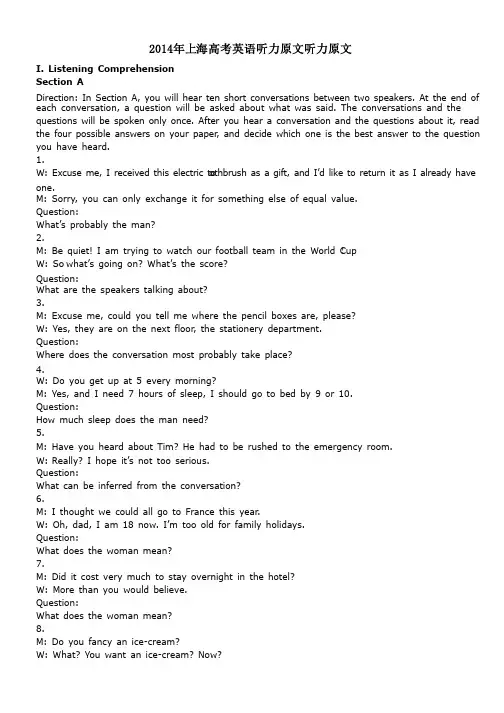
2014年上海高考英语听力原文听力原文I. Listening ComprehensionSection ADirection: In Section A, you will hear ten short conversations between two speakers. At the end of each conversation, a question will be asked about what was said. The conversations and thequestions will be spoken only once. After you hear a conversation and the questions about it, read the four possible answers on your paper , and decide which one is the best answer to the questionyou have heard.1.W: Excuse me, I received this electric to othbrush as a gift, and I’d like to return it as I already have one.M: Sorry, you can only exchange it for something else of equal value.Question:What’s probably the man?2.M: Be quiet! I am trying to watch our football team in the World Cup! So W: So what’s what’s going on? What’s the score? Question:What are the speakers talking about?3.M: Excuse me, could you tell me where the pencil boxes are, please?W: Yes, they are on the next floor , the stationery department.Question:Where does the conversation most probably take place?4.W: Do you get up at 5 every morning?M: Yes, and I need 7 hours of sleep, I should go to bed by 9 or10. Question:How much sleep does the man need?5.M: Have you heard about Tim? He had to be rushed to the emergency room. W: W: Really? Really? I hope it’s not too serious.Question:What can be inferred from the conversation?6.M: I thought we could all go to France this year. W: Oh, dad, I am 18 now. I’m too old for family holidays.Question:What does the woman mean?7.M: Did it cost very much to stay overnight in the hotel?W: More than you would believe.Question:What does the woman mean?8.M: Do you fancy an ice-cream?W: What? You want an ice-cream? Now?Question:What is implied in the woman’s reply?9.M: Oh this is so annoying. Where on earth did I put my copies?W: You never learn your lessons.Question:What does the woman mean?10.M: I don’t know if Steve likes the apartment or not.W: He said he liked it. But then he didn’t want to sign the contract.Question:What can be concluded about Steve?Section BDirections: In Section B,you will hear two short passages, and you will be asked three questions on each of the passages. The passages will be read twice, but the questions will be spoken only once. When you hear a question, read the four possible answers on your paper and decide which one would be the best answer to the question you have heard.Questions 11 through 13 are based on the following passage.razil where it was started byI’m going to tell you about a sport, Capoeira. Capoeira came from Bthe African slaves. They used it for entertainment and also to fight against their white masters. It is a kind of Kungfu which is also like a dance. You need to be very fit and strong and you should have a good control of your body. You often have to use your hands to balance. Everyone sits around in a circle, singing and playing music and two people fight in the center. T o fight the other per son, you kick with your feet, but nowadays, there is no contact. As soon as you see other person’s hand or foot coming towards you, you have to move away quickly. You must be careful the other person doesn’t kick you. If the other person kicks you, then you lose. I have been doing Capoeira for three years. I have improved a lot since I first started, and now I wear a green belt. In the future, I would like to become a trainer and teach other people about this beautiful sport. Questions:11. Who first started Capoeira?12. What is required if a man wants to do Capoeira?13. When can a man be judged to lose in Capoeira?Questions 14 through16 are based on the following passage:As a hotel manager, I have to walk around and smile all the time. Every day, I arrive at the hotelrst review the night manager’sat 7:30 a.m. Before I prepare for the daily operational meeting, I fireports and catch up on the E-mails that come through overnight. Then I check on breakfast and walk through the restaurant to say hello to guests. At 9 a.m., there is the daily operational meeting where staff report on what’s happened the night before and what need to be careful. At 9:45, I am very visible and always around the hotel meeting and greeting staff. I have to keep an eye on what is going on, everything from the temperature of the shower to the variety of food. And we have to bear in mind cultural differences. For example, the Japanese want a running bath and the Americans are fine just with ashower. At 1 p.m., I always eat with a different member of staff as this is a valuable way of finding out what is going on. From 2 p.m. to 7 p.m., there aredifferent meetings concerning all the aspects of hotel operation. I try to get through all the work by 7 p.m. Questions:14. What does the speaker do first after arriving at the hotel?15. Which of the following detail shows the speaker concerns about the cultural differences? 16. What does thepassage mainly tell us?Section C Directions: In section C, you will hear two longer conversations. The conversations will be readtwice. After you hear each conversation, you are required to fill in the numbered blanks with theinformation you have heard. Write your answers on your answer sheet. Blanks 17 through 20 are based on the following conversation:W: Next patient, please.M: Morning, Doctor .W: It’s Mr . Gerald, isn’t it?M: That’s right.W: Is that G-E-R-A-L-D? M: Yes, it is.W: Right. Now, what seems to be the trouble?M: Well, I’ve had this awful flu, and a terrible cough. W: I see. How long have you been feeling like this?M: Oh, about three or four days, I suppose.W: Have you had a temperature?M: It’s normal.W: Okay. I’ll just look at your chest. Now breathe in and out slowly. And again. Good. That’s it. M: Thank you.W: Well, I’ll give you some cough mixture. T ake one spoonful every four hours for the next five days.M: OK, Doctor .Blanks 21 through 24 are based on the following conversation.M: I don’t know what to read, can you recommend anything?W: Hum, have you read a book by John Wyndham, called Web? I’ve just finishedit. M: No, I haven’t. What sort of book i s it?W: Well, you know John Wyndham writes science fiction stories. This one is a novel set on Pacific Island.M: What’s it about then?W: Well, the main characters are a man and a woman, who join in a group of people hoping to start the perfect society.M: I see. And do they succeed?W: No. It turns out that the island they go to is full of huge spiders. They are determined to destroyeverything there, including any people who come. But I won’t tell you what happens next, or youwon’t want to read it.M: M: Okay. Okay. I’ll give it a try. Thanks.。
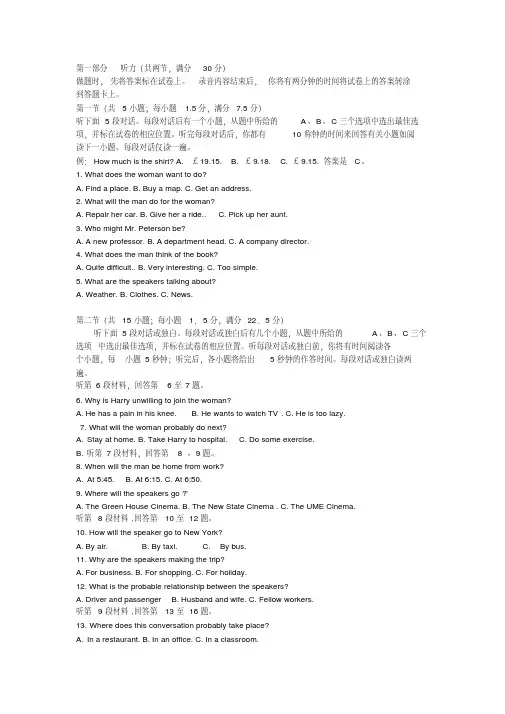
第一部分听力(共两节,满分30分)做题时,先将答案标在试卷上。
录音内容结束后,你将有两分钟的时间将试卷上的答案转涂到答题卡上。
第一节(共5小题;每小题 1.5分,满分7.5分)听下面5段对话。
每段对话后有一个小题,从题中所给的A、B、C三个选项中选出最佳选项,并标在试卷的相应位置。
听完每段对话后,你都有10称钟的时间来回答有关小题如阅读下一小题。
每段对话仅读一遍。
例:How much is the shirt? A. £19.15. B. £9.18. C. £9.15. 答案是C。
1. What does the woman want to do?A. Find a place.B. Buy a map.C. Get an address.2. What will the man do for the woman?A. Repair her car.B. Give her a ride..C. Pick up her aunt.3. Who might Mr. Peterson be?A. A new professor.B. A department head.C. A company director.4. What does the man think of the book?A. Quite difficult..B. Very interesting.C. Too simple.5. What are the speakers talking about?A. Weather.B. Clothes.C. News.第二节(共15小题;每小题1.5分,满分22.5分)听下面5段对话或独白。
每段对话或独白后有几个小题,从题中所给的A、B、C三个选项中选出最佳选项,并标在试卷的相应位置。
听每段对话或独白前,你将有时间阅读各个小题,每小题5秒钟;听完后,各小题将给出5秒钟的作答时间。
每段对话或独白读两遍。
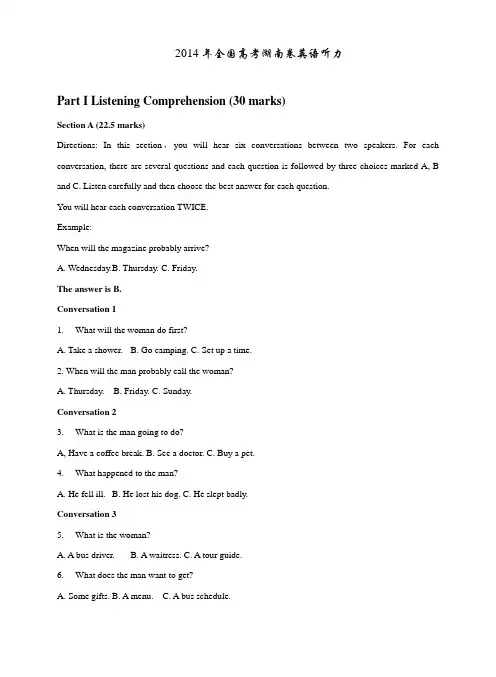
2014年全国高考湖南卷英语听力Part I Listening Comprehension (30 marks)Section A (22.5 marks)Directions: In this section,you will hear six conversations between two speakers. For each conversation, there are several questions and each question is followed by three choices marked A, B and C. Listen carefully and then choose the best answer for each question.You will hear each conversation TWICE.Example:When will the magazine probably arrive?A. Wednesday.B. Thursday.C. Friday.The answer is B.Conversation 11. What will the woman do first?A. Take a shower.B. Go camping.C. Set up a time.2. When will the man probably call the woman?A. Thursday.B. Friday.C. Sunday.Conversation 23. What is the man going to do?A, Have a coffee break. B. See a doctor. C. Buy a pet.4. What happened to the man?A. He fell ill.B. He lost his dog.C. He slept badly.Conversation 35. What is the woman?A. A bus driver.B. A waitress.C. A tour guide.6. What does the man want to get?A. Some gifts.B. A menu.C. A bus schedule.Conversation 47. What did the man do yesterday?A. He saw a movie.B. He watched TV.C. He visited some friends.英语试题第1页(共12页)8. What time will the speakers probably meet this Saturday evening?A. At 6:30.B. At 7:00.C. At 7:30.9. Which of the following will the man buy?A. Some drinks.B. A birthday cake. G. Concert tickets. Conversation 510. What is the woman doing now?A. She is serving a customer.B. She is conducting an interview.C. She is doing some recording.11 .When does the man go to the nursing home?A. Tuesdays.B. Thursdays.C. Sundays.12. Where will the man probably be working next Monday?A. At the airport nearby.B. In the studio next door,C. At the store downtown.Conversation 613. Why does the woman call the man?A. The oven doesn’t work.B. The heater won’t start.C. The plug is broken.14. Who will handle the problem first tomorrow evening?A. The woman.B. The man. C A worker.15. Who is the woman speaking to?A. Her husband.B. Her house owner.C. Her boss.Section B (7.5 marks)Directions: In this section, you will hear a short passage. Listen carefully and then Jill in the numbered blanks with the information you have heard. Fill in each blank with NO MORE THAN THREE WORDS.You will hear the short passage TWICE.2014年全国高考湖南卷英语听力原文Conversation 1M: Well, it’s been this hot for so long.W: Yeah, I can’t wait to go home and take a cold shower.M: The worst should be over soon. I know it will be cool by this Thursday.W: Really. I guess we can go camping on Sunday. Give me a call on Friday to set up the time. OK?Conversation 2M: Hi! Jean! I am going out for a coffee break. Will you join me?W: Sure! Oh! Peter, you look tired. Are you getting sick?M: No. My new neighbor’s dog kept me awake all night. It never stopped barking.W: Oh, dear. You’d better go and talk to your neighbor about it.Conversation 3M: Ladies and gentlemen, right now, it is 12 o’clock, and we are going to stop at this restaurant for lunch. The bus driver will pick you up in an hour.W: Where will he meet us?M: Right here, in front of the restaurant. And be sure to be on time.W: But I want to buy some gifts before we leave. Do you know any good place around here?Conversation 4M: Hello, Brian’s speaking.W: Hi! Brian, it’s Mary here. Hope I haven’t caught you at a bad time.M: No, no. I was just watching TV.W: Oh, good. Have you had a good weekend?M: Yeah. It’s been good. I went to the cinema with some friends yesterday. What about you?W: Not too bad. Hey, actually, I am calling because it’s my birthday this Saturday. I was wondering if you would come.M: That sounds good. That time?W: It’s 7 o’clock, OK? David won’t finish work until 6:30.M: Oh, sorry. I am afraid I can’t make it. Is 7:30 all right?W: Sure. 7:30, then. Do you want me to bring something, like a cake or some drinks?M: Oh, no. I will get the food and everything. Just come and help me celebrate.W: Oh, in that case. I will invite you to the piano concert next Friday.M: That will be great. Thanks.W: OK, I will get the tickets now.Conversation 5M: Do you have any job experience?W: Only a little. I helped out on my father’s office last year. And I worked in a recording studio last month.M: That’s good. Can work every day?W: Yes, I can work any day of the week. Oh, no, except Thursday. I work at a nursing home in the neighborhood that day.M: When would you be able to start?W: Next Monday.M: OK. That’s great. We have two stores, a very busy one downtown and one near the airport with almost no customers even on weekends.W: I want to work near the airport.M: Good. Everyone now hates it. There are few customers, so you will most likely be doing jobs such as carrying big boxes and cleaning.W: Oh, no. Er, wait. er, I like the store downtown.M: OK. That’s settled. See you next Monday.Conversation 6W: Hello! Tony speaking!M: Hi! It’s Susan from your flat on Main Street.W: Oh. Hi, Susan, what can I do for you?M: Em, we’ve got a bit of problem in the flat. The oven is not working. I found it yesterday.It was on, but it wasn’t getting hot. I had a look at the plug. But it seems to be OK. Could you get someone to come to have a look at it for us?W: Ah, was it working yesterday?M: Yeah, but we couldn’t get it going last night. We use it quite a lot. So it will be good if we could itfixed.W: Oh, OK. Ah, I will come around and see if I can fix it. If I can’t, I will get a worker in or get it changed instead.M: OK, thanks a lot.W: Ah, I won’t be able to come until tomorrow evening. See about 7. Will someone be at home then? M: Oh, yeah. I will be here.W: OK, then. See you about 7. Bye!Section 2Hello, Sam. This is Kelly Black. I will be out of the office all day today. Here is a list of things you will need to do. First please call Mr. Brown and change the time of the appointment. Also send an e-mail to everybody in the office and remind them of the meeting next week. Don’t forget to speak to the repairman about the broken light in my office. Hm. Let’s see. I know there are a few more things. Oh, yes. Please make a list of all the employees and give it to Miss Baxter, owner of the gift shop. OK, Sam. I think that’s everything. Oh, one more thing. Please take the package on my desk to the post office if you have time. And that’s it. Thanks, I will see you tomorrow morning.1-5. ABACC 6-10. AACCB 11-15. BCABB16. change 17. meeting 18. light 19. gift shop 20. the package。
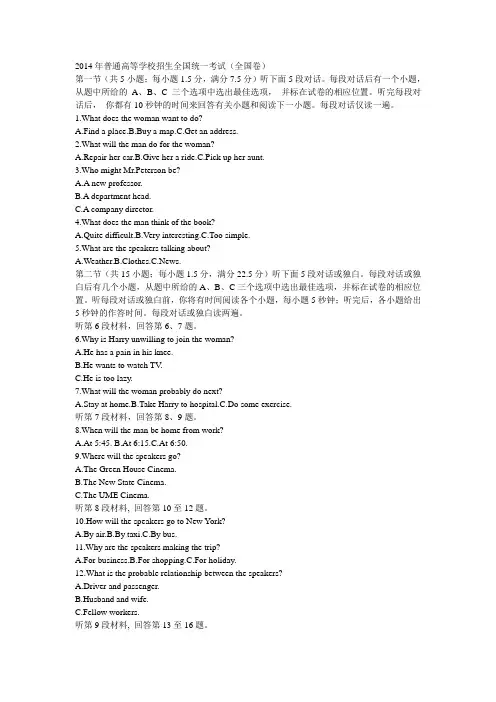
2014年普通高等学校招生全国统一考试(全国卷)第一节(共5小题;每小题1.5分,满分7.5分)听下面5段对话。
每段对话后有一个小题,从题中所给的A、B、C三个选项中选出最佳选项,并标在试卷的相应位置。
听完每段对话后,你都有10秒钟的时间来回答有关小题和阅读下一小题。
每段对话仅读一遍。
1.What does the woman want to do?A.Find a place.B.Buy a map.C.Get an address.2.What will the man do for the woman?A.Repair her car.B.Give her a ride.C.Pick up her aunt.3.Who might Mr.Peterson be?A.A new professor.B.A department head.C.A company director.4.What does the man think of the book?A.Quite difficult.B.Very interesting.C.Too simple.5.What are the speakers talking about?A.Weather.B.Clothes.C.News.第二节(共15小题;每小题1.5分,满分22.5分)听下面5段对话或独白。
每段对话或独白后有几个小题,从题中所给的A、B、C三个选项中选出最佳选项,并标在试卷的相应位置。
听每段对话或独白前,你将有时间阅读各个小题,每小题5秒钟;听完后,各小题给出5秒钟的作答时间。
每段对话或独白读两遍。
听第6段材料,回答第6、7题。
6.Why is Harry unwilling to join the woman?A.He has a pain in his knee.B.He wants to watch TV.C.He is too lazy.7.What will the woman probably do next?A.Stay at home.B.Take Harry to hospital.C.Do some exercise.听第7段材料,回答第8、9题。
2014年高考英语全国卷听力真题+原文+答案111843_5546e513cc1e9.m p3第一节(共5小题;每小题1.5分,满分7.5分)听下面5段对话。
每段对话后有一个小题,从题中所给的A、B、C三个选项中选出最佳选项,并标在试卷的相应位置。
听完每段对话后,你都有10秒钟的时间来回答有关小题和阅读下一小题。
每段对话仅读一遍。
1. What does the woman want to do?A. Find a place.B. Buy a map.C. Get an address.2. What will the man do for the woman?A. Repair her car.B. Give her a ride.C. Pick up her aunt.3. Who might Mr. Peterson be?A. A new professor.B. A department head.C. A company director.4. What does the man think of the book?A. Quite difficult.B. Very interesting.C. Too simple.5. What are the speakers talking about?A. Weather.B. Clothes.C. News.第二节(共15小题;每小题1.5分,满分22.5分)听下面5段对话或独白。
每段对话或独白后有几个小题,从题中所给的A、B、C三个选项中选出最佳选项,并标在试卷的相应位置。
听每段对话或独白前,你将有时间阅读各个小题,每小题5秒钟;听完后,各小题给出5秒钟的作答时间。
每段对话或独白读两遍。
听第6段材料,回答第6、7题。
6. Why is Harry unwilling to join the woman?A. He has a pain in his knee.B. He wants to watch TV.C. He is too lazy.7. What will the woman probably do next?A. Stay at home.B. Take Harry to hospital.C. Do some exercise.听第7段材料,回答第8、9题。
2014 年普通高等学校招生全国统一考试(天津卷)试卷A 1.C 2. B 3. A 4. A 5. B 6. A 7.C 8. B 9.A 10. B11. C 12. A 13. B 14. A 15. C试卷B 1.C 2. B 3. A 4. C 5. A 6.A 7. B 8. B 9. B 10.A11. C 12. B 13. C 14. A 15. C试卷AText 1W: I’ve never seen a machine like this before. I have no idea how to buy a drink on it. Could you help me?M:Sure, it is quite easy.Text2M: Do you have any plans to write books for teenagers?W: Actually, my first two novels were for teenagers, I’m thinking and writing another one next year.Text3W: Sir, how long will I wait before the result comes out?M: About two weeks will give you a call, if you get the job.Text4M: Feel like having some cake, my mom made it. W: Chocolate cake? well , that I can never refuse. Text5W: Until cold, why until wear a jacket?M: I got up late this morning. So I run out of the house without listening the whether forecast.Text6W: Where shall we seat it , look, there are some seats in the corner.M: But I think the seat by the window are better. It will be colder.W: OK, the re are still some by the window. Let’s go and seat there.M: Fine.W: So, what would you like to eat?M: I really hungry, I think I will have beef and salad, beef in this restaurant taste very good. Why don’t you try it?W: I don’t eat meat, I will have a cheese sandwich instead.M: What about drinks? I will have some black tea, my favorite drink.W: How much it is that?M: It’s two dollars fifty cents.W: That’s really expensive. I like something cheaper.I only have five dollars left. I will have a cup of coffee. It is only one dollar fifty cents.Text7M: Hi, mom, how are you?W: I’m fine, Jack. How is the math course going?M: It’s going well actually. I really enjoy unit three. Mainly, because it is not that difficult compare with other units. W: Good, and what about the teachers? What are they like?M: Well, I’ve got four, on the role, highly knowledgeable, but professor John is my favorite. I really response well to the way he teaches.W: And are you fellow students nice to ?M: Yes, I made lots of friends and everyone seems to be very hard working. The course has lots of great work, but to be honest, that is really the way I like, I prefer to study alone.W: Oh, well, I suppose to everything can be perfect. You will get you to it.M: I will try mom. Thanks.Text 8 独白Good afternoon, everyone! Thanks to you hard work on our company and sounds really well over the past twelfths months, so we have decided to give you a day off next Friday to go on a day trip pay for by the company. There were two types of choices, one is the nature choice which is the trips to the lakes. You all know how lovely the lakes are up this time of year and don’t forget to bring alone your working shoes. The bus will be leaving at 8:30 in the morning and gets back at 6:30 in the evening. The second choice is the historical tool which is a trip to a castle. One think though, they will told us that anyone who comes to the castle has to wear soft shoes. The reason for this is that some of the wood floors in the castle are very old. And can be easily damaged by other kinds of shoes. The bus will also be leaving at 8:30 in the morning but will bring you back here at 4:30 in the afternoon. That’s all for me for the moment any questions.2014试卷BText 1W: Has Jammy returned from Berlin yet?M: Yes, he came back to London just a few days ago, but he is leaving for Rome next week.Text 2M: Would you like to go to the moves with Linda and me on Sunday?W: I wish I could, but I’m having dinner with m y brothers.Text 3W: Come into this room and wait for a while.M: The doctor told me to wait inside and then the nurse told me to wait outside. Now I’m wrong again. Text 4W: How did you like the comfort, I found it really moving.M: I love classical music but that conductor did not seem very experienced.Text 5W: These summer days are getting to be more than I can take. It was even too hot to go to the swimming pole yesterday.M: Hold on, the weather report said there will be some change by the end of the week.Text 6W: Dad, pocket money day, can I have my pocket money?M: Oh, I forgot about that.W: You always forget.M: I gets I do. How much do I owe you?W: Just 30 dollars.M: 30 dollars? Why do I owe you that much? Just seems like I paid you the other day.W: No, you forgot every Saturday and I have been waited.M: Well, I’m not sure if I have that much.W: Go to the bank, you have lots of money there. M: Lots of money, er? So what you going to do with your pocket money?W: Well, last time, I put some savings and get some to the poor people. This time I going to buy some books.M: That sounds great, honey. You will have the money.Text 7M: Hello, I want to return these four books.W: But two of them would you on Monday. You’re late by three days. I’m afraid you have to pay the fine.M: Oh, yes, I know that. But I was sick and not able to come to the college these four days. You excuse the delay and special circumstances, don’t you?W: Yes, we do. But you should told to the librarian. I’m working here part time.M: OK, I will do it later. Now, can I borrow these two books.W: Yes, would you please sign the card.M: Sure, but I have to point out one page is missing in this book. It is 231.W: Mine, somebody has stolen it away. I have to mark page 230 to indicate that 231 has been stolen out.M: It’s this necessary.W: Yes, otherwise, this maybe blame on you or the next borrow work after you.M: Thanks very much.Text 8Good morning, everyone! Welcome to the English center of our university. I’d like to introduce the services we offer. We have a variety of language courses. In the first semester, we run an eight week conversation class for students of non-English speaking background. We wish to improve their spoken English. The course is on Tuesdays between 12:30 and 1:30. Please register with the secretary before this Friday. For those interested into developing their writing skills, we have a six week courses which run for 2 hours between 4 and 6 on Wednesday afternoons beginning in week one. It focus one the skills need it for the writing tasks in the departments of economics and social sciences. You must be a student in either the departments to sign up for it. Toward the end of this semester, you might like to sign up for a dissemination skills class. The course around for 5 weeks, 2 hours a week. It is not necessary to register before the course starts . Just turn up for the first class.。
We are going to take one of the most important exams in China and I am going to talk about one important part of the exam. That part is listening.2014年普通高等学校招生全国统一考试英语第I卷第一部分听力(共两节,满分30分)做题时,先将答案标在试卷上。
录音内容结束后,你将有两分钟的时间将试卷上的答案转涂到答题卡上。
第一节(共5小题;每小题1.5分,满分7.5分)听下面5段对话。
每段对话后有一个小题,从题中所给的A、B、C三个选项中选出最佳选项,并标在试卷的相应位置。
听完每段对话后,你都有10秒钟的时间来回答有关小题和阅读下一小题。
每段对话仅读一遍。
例:How much is the shirt?A. £19.15.B. £9.18.C. £9.15.答案是C。
1. What does the woman want to do?A. Find a place.B. Buy a map.C. Get an address.2. What will the man do for the woman?A. Repair her car.B. Give her a ride.C. Pick up her aunt.3. Who might Mr. Peterson be?A. A new professor.B. A department head.C. A company director.4. What does the man think of the book?A. Quite difficult.B. Very interesting.C. Too simple.5. What are the speakers talking about?A. Weather.B. Clothes.C. News.第二节(共15小题;每小题1.5分,满分22.5分)听下面5段对话或独白。
2014年广东省高考英语听说考试真题A三问部分:Question 1:How do colors affect our buying decisions?/How do colors influence our buying decisions?/How do colors influence our purchasing behavior?/How do colorsaffect our buying behavior?/How do colors influence our buying behavior?/Howdo colors affect our purchasing behavior?Answer 1: People have different feelings about colors and their feelings help them decide what to buy. For example, blue makes people feel peaceful, quiet. It doesn’t createstrong emotions. So it’s a favorite for banks and insurance companies. And forselling products, it’s often used to suggest something pure and fresh.Question 2:What color is more attractive to customers?/What color can attract customers more?/What color can appeal to more customers?/What color can attrac t people’sattention more?/What color can draw people’s attention more?Answer 2:Well, you can sell almost anything with a red. It’s a hot color, which suggests a feeling of energy and even excitement, it catches your attention. You often see redon magazine covers. But if you use it too much, it looks cheap and may makepeople tired.Question 3:Is green a popular color in advertising?/Is green a fashionable color in advertising? Answer 3:Surprisingly, green isn’t used much in advertising except for garden products.Although it’s friendly and cool, it can also be quite strong and many peopleassociate it with unpleasant ideas.五答部分:Question 1:How did Dr. Brown do his research?Answer 1:By doing surveys and interviews.Question 2:How much time did Dr. Brown spend on his book?Answer 2:Thirteen months.Question3:What does blue suggest in advertising?Answer 3: Something pure and fresh.Question 4:Why can’t we use red too much in advertising?Answer 4:It looks cheap and may make people tired.Question 5:What color is suitable for garden products?Answer 5:Green.参考复述:One morning, Tom was on the school bus with other kids. But then the bus driver, who was feeling unwell, suddenly passed out. It happened very quickly, and the bus began to run off the road. All the kids screamed except Tom, because he knew a lot about cars and often helped his father repair his car. So Tom ran to the front of the bus, and pushed the bus driver to one side. He stepped on the brakes and stopped the bus. Nobody was hurt, and the story ofTom saving the kids on the bus became well known. He even appeared on television, and his school gave him an award. Tom’s father was proud of him, and said he’d teach Tom to drive when Tom was old enough.。
2014年3月二级高考英语听力试题Text 1W: Oh, what a pretty dress! My daughter would love it. But it seems a bit too large. Do you have a smaller size? M: Sorry. This is the only one left. But don’t worry. Children grow fast!W: Yes, that’s true. I’ll take it.1. What will the woman do about the dress? CC. She’ll buy it.Text 2W: These DVDs will be due back on Thursday the 7th.M: How much more should we pay to keep them another week?2. What are the speakers talking about? BB. Borrowing DVDs.Text 3M: What did you think of Dana’s speech today?W: Well, she must have spent a lot of time preparing it. I ca n’t believe I could sit for that long without feeling bored.3. What did the woman think of Dana’s speech? CC. Well-prepared.Text 4W: Could you help us carry these boxes, sir?M: Oh, I’d like to help you, but I’ve got a pain in my back.4. What does the man mean? AA. He is unable to give help.Text 5W: I wonder if Simon will be here by 8. He’s supposed to be.M: His wife said he left at 7:30, so he should be here by 8:10 at the latest.5. When is Simon supposed to arrive? BB. 8:00.Text 6M: Are you free on the weekend?W: I haven’t got any plans yet. Why?M: There’s an exhibition of Chinese paintings at the public library. W ould you like to go with me?W: I’d love to. But when?M: How about Saturday morning? It’s cooler in the morning, and may be less crowded.1W: I’m afraid I cannot get up early on weekends. I prefer Saturday afternoon. Believe me, there won’t be too many people.M: So, shall we meet at 2 Saturday afternoon?W: Ok, that would be great. I’ll be waiting for you at my home.听下面一段对话,回答第6和第7题。
2014年广东省高考英语听说考试真题EPart B Role Play三问部分:Question 1:Didn’t you say you wanted to be a language teacher?/Didn’t you say you wanted to become alanguage teacher?/Didn’t you say you wanted to workas a language teacher?Answer 1: Yes, I am thinking about it. I’m quite interested in teaching and I enjoy communicating with students.Last summer, I worked as a language teacher in anEnglish camp in China, and taught some Englishclasses for a month.Question 2:How do you feel the first day of teaching?/How was your first day of being a teacher?/How was your firstday of teaching?Answer 2:It was all right. Was n’t as terrifying as I thought it would be. I think the students were happy. Theinteresting thing is that we speak English and we thinkwe know the grammar. But when I was teaching, Isounded that I didn’t know much about grammar. Question 3:Why do you think you can become a language teacher?/Why do you think you can be a languageteacher?Answer 3:That’s a good question. I study education and I’ve gotten to know some education theories and teachingmethods. Usually, a language teacher should have goodlanguage skills and needs to be patient and enthusiastic.I think I’m the right person. Don’t forget, I am a nativespeaker of English.五答部分:Question 1:What’s new on campus this Saturday?Answer 1:There’s a job fair./There will be a job fair.Question 2:What are you going to do after you get the degree? Answer 2:Work in a law firm.Question 3:Where did Tom teach English last summer?Answer 3: In an English camp in China.Question 4:How is Tom’s English grammar?Answer 4:He doesn’t know much about grammar.Question 5:What does a language teacher need?Answer 5: He needs to be patient and enthusiastic and have good language skills./He needs good language skills and to bepatient and enthusiastic./Good language skills, patienceand enthusiasm.Part C Retelling参考复述:Tom and Mary’s parents said they could have a dog. They were very happy and went to their neighborhood pet shop. But it was small, and there were only two dogs. One was big and black, and the other was small and white. Tom wanted the black one, and Mary wanted the white one. They couldn’t convince eac h other, so they decided to race home to decide who’d choose the dog. But before the race started, Tom told Mary to look at her shoes. When she looked down, he quickly ran ahead. So he got home first, but Mary said the race had been unfair. Then they agreed to have a race back to the pet store. But when they got there, the dogs weregone. The pet shop manager told them that a man had come while they were gone and had bought both of the dogs.。
2014年高考英语全国卷听力真题+原文+答案111843_5546e513cc1e9.mp3第一节(共5小题;每小题1.5分,满分7.5分)听下面5段对话。
每段对话后有一个小题,从题中所给的A、B、C三个选项中选出最佳选项,并标在试卷的相应位置。
听完每段对话后,你都有10秒钟的时间来回答有关小题和阅读下一小题。
每段对话仅读一遍。
1. What does the woman want to do?A. Find a place.B. Buy a map.C. Get an address.2. What will the man do for the woman?A. Repair her car.B. Give her a ride.C. Pick up her aunt.3. Who might Mr. Peterson be?A. A new professor.B. A department head.C. A company director.4. What does the man think of the book?A. Quite difficult.B. Very interesting.C. Too simple.5. What are the speakers talking about?A. Weather.B. Clothes.C. News.第二节(共15小题;每小题1.5分,满分22.5分)听下面5段对话或独白。
每段对话或独白后有几个小题,从题中所给的A、B、C三个选项中选出最佳选项,并标在试卷的相应位置。
听每段对话或独白前,你将有时间阅读各个小题,每小题5秒钟;听完后,各小题给出5秒钟的作答时间。
每段对话或独白读两遍。
听第6段材料,回答第6、7题。
6. Why is Harry unwilling to join the woman?A. He has a pain in his knee.B. He wants to watch TV.C. He is too lazy.7. What will the woman probably do next?A. Stay at home.B. Take Harry to hospital.C. Do some exercise.听第7段材料,回答第8、9题。
8. When will the man be home from work?A. At 5:45.B. At 6:15.C. At 6:50.9. Where will the speakers go?A. The Green House Cinema.B. The New State Cinema.C. The UME Cinema.听第8段材料,回答第10至12题。
10. How will the speakers go to New York?A. By air.B. By taxi.C. By bus.11. Why are the speakers making the trip?A. For business.B. For shopping.C. For holiday.12. What is the probable relationship between the speakers?A. Driver and passenger.B. Husband and wife.C. Fellow workers. 听第9段材料,回答第13至16题。
13. Where does this conversation probably take place?A. In a restaurant.B. In an office.C. In a classroom.14. What does John do now?A. He's a trainer.B. He's a tour guide.C. He's a college student.15. How much can a new person earn for the first year?A. $10,500.B. $12,000.C. $15,000.16. How many people will the woman hire?A. Four.B. Three.C. Two.听第10段材料,回答第17至20题。
17. How long has the speaker lived in a big city?A. One year.B. Ten years.C. Eighteen years.18. What is the speaker's opinion on public transport?A. It's comfortable.B. It's time-saving.C. It's cheap.19. What is good about living in a small town?A. It's safer.B. It's healthier.C. It's more convenient.20. What kind of life does the speaker seem to like most?A. Busy.B. Colourful.C. Quiet.听力原文Text 1W: Excuse me. This is the address. How do I find it?M: Right. You'll need a street map. Here's one, andI'll show you where it is.Text 2W: Oh my! My car broke down, and I have to meetmy aunt at the railway station before noon.M: You're lucky. I can drop you off on my way.Text 3W: Did you hear that Mr. Peterson is coming next week, Gordon?M: Yes, so I called all the department heads to my office this morning. We need to give himreports on our program.Text 4W: I hope you like the book I lent you. I wasn't sure if you'd be interested.M: I had the same doubt at first. But once I started, I simply couldn't put it down.Text 5W: What is going on? It's May, and we still have to wear warm clothes.M: Well, there's some good news on the radio. You probably can wear shorts tomorrow.Text 6W: Harry, let's play some ping-pong today.M: I'd love to play a set or two, but my right arm hurts. I've decided to stop playing ping-ponguntil it feels better.W: Well, how about going skating?M: I'd like to, but my knee hurts, too.W: Harry, stop making excuses! You're just lazy.M: No, I'm not! You know, there's a basketball match on TV today. Let's just stay home andwatch it.W: OK. You stay, and I'll play with Helen.Text 7W: What do you want to do tonight?M: How about going to the cinema? I should be home from work at 5:45. Then we can go outand eat before we see a film.W: What do you want to see?M: There's a good art film at the Green House Cinema.W: Let's see…it starts at 6:15. I don't think we can get there in time to see the beginning. Howabout the action film at the New State Cinema? It starts at 6:50. Perhaps the 7:00 one at theUME Cinema is even better. It stars Jackie Chan.M: OK, that's fine. I like him, too.Text 8M: Hey, Lucy. Do you have some time to talk about next week's trip with me?W: Sure, Dave.M: OK. So, we're leaving on Monday from Hartsfield International Airport, and returning onFriday. Do we take ourselves to the airport? Maybe we need to book a taxi, or just go by bus.W: No, we don't have to. The company car will pick us up and take us there.M: Oh, that's good. When?W: Our flight leaves at 11:00 a.m., so they should pick us up between 8:00 and 9:00 a.m.Besides, the company pays for our trip, including hotel and food.M: How much will that be?W: Well, New York is a pretty expensive city. So, each of us will get $200 a day.M: Oh, OK. Thanks for telling me that.W: You're welcome.Text 9W: Please sit down. Let's see…you're Mr. Smith. Is that correct?M: Yes. John Smith.W: And you're interested in this job?M: Yes, I am. I'll graduate from college the coming June. My major is Chinese.W: I see. Have you ever done any work in this field?M: Yes, I used to be a tour guide for Chinese travellers.W: Good. Now, how much money do you expect to have for a year?M: From what I've read, it seems that a starting pay would be around $12,000 a year.W: Here, you would start at $10,500 for the first year…a kind of training period. Then youwould go to $15,000.M: That sounds fair enough. What do you think are the chances for me to get a job here?W: Well, I'm talking to three people today and four tomorrow. We'll be hiring two people. You'llhear from us sometime next month. Good luck! And thanks for coming in today.Text 10M: Well, I'd love to share with you my personal opinions on city life and life in small towns. Igrew up in a small town until I was 18 and then moved to a big city, so I have experienced thegood and bad sides of both. I never thought that I would like living in a big city, but I waswrong. After ten years of living in one, I can't imagine ever living in a small townagain. Surelysmall towns and big cities both have some problems in terms of transport. In a small town,you have to own a car to make life comfortable. You can't get around without one becausethere isn't any kind of public transport. Big cities generally have heavy traffic and expensiveparking, but there you have a choice of taking public transport, which is cheaper than driving.So, if you don't have a car, you'd better live in the city. I also love the exciting life in big cities. Ican always enjoy a lot of films, concerts, and other wonderful shows. However, these things arenot common in small towns. The final thing I like about large cities is that you can meet differentkinds of people. However, you seldom find such a variety of people in a smaller town. I thinkthat living in an area where everyone was just like me would quickly become dull. Of course,safety should be considered, and that's one area where small towns are better than big cities.Still, I would rather be a bit more careful and live in a large city than to feel safe but dull.答案1-5 ABCBA6-10 BCACA11-15 ACBCA16-20 CBCAB。